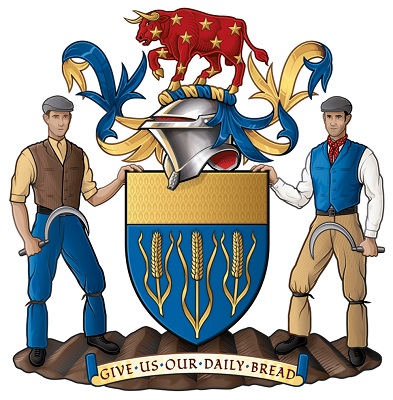On a cool, rainy day on 21 May, a group of 18 Liverymen from the Company set off for a visit to the Surrey Docks Farm (SDF), ably led by Stuart Philpot.
The WCOF has had links with and supported the SDF for over 30 years, during which time it has grown into the bustling farm it is today. Two of the key roles in which we are pleased to see it performing so well are engaging those who might be less able in society than ourselves and bringing an awareness and understanding of food, farming and nature to those with little or no exposure to it.

Angus cattle, with the unusual backdrop of Canary Wharf
Upon arrival at the 2.2-acre city site we were welcomed by Farm Manager Gemma Hooper and Animals Manager Claire Ellis-Elson, who have been there 12 and 33 years respectively.
Gemma is flourishing in her role, no doubt in part due to the expert guidance of Richard Whitlock (PM 20/21). She also went on our Challenge of Rural Leadership course in 2019 and says she especially benefited from learning how to improve her management of people and leading groups.

The old MF tractor still comes in very handy
After meeting some of the special needs volunteers we moved to the forge; the last known working one in London, then on to look at the specially constructed brick oven. This enables anyone to cook their own pizzas, often using farm-grown ingredients for toppings. This is especially valuable as some families have little in the way of cooking facilities, often just a microwave.
Gemma and Claire told us the education local school groups (and their teachers!) get from hearing about what animals eat, which meat is produced, how animals feed their young and much more.

The mobile farm
Animal petting is strongly encouraged as many children have never seen farm animals, let alone touched one. Bottle-feeding lambs returns a strong income stream, as do the ‘animal experiences’. The whole environment is so utterly different from paved streets and blocks of flats.
An example of WCOF support was when Lottery Funding was won to facilitate a mobile farm lorry to enable SDF to set up in school playgrounds; we also funded and advised on the purchase of hurdles to build pens for the animals.
James, horticulturist of 30 years at City Farm, gave us an insight to the farm’s management of the muck heap – the farm makes and sells its own compost – and he described more about the ingenious rainwater harvesting methods and the on-site biodigester.
The farm also supports two apprentices for an 18-month course; one in agriculture and one horticulture, both of which help with the management of the farm.
This is yet another way in which the farm can support people needing a start. All together an informative and uplifting day.

Liverymen at lunch: Back row L-R: Gemma Hooper, Jo Philpot, Duncan Couper. Middle row: Edward Crawford, Stephen Watkins, Christopher Day, Rosie Carne, Alison and Paul Hovesen. Front row: Paul and Christopher Philpot, John Heath, Hugh Wykes, Richard Whitlock.







Post a comment